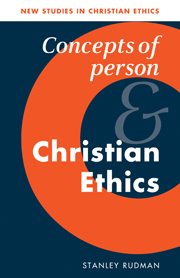Book contents
- Frontmatter
- Contents
- General editor's preface
- Acknowledgements
- List of abbreviations
- Introduction
- PART I ‘PERSON’ IN CONTEMPORARY ETHICS
- 1 ‘Une catégorie de l'esprit humain: la notion de personne’
- 2 Meaning and criteria: person/human being
- 3 Moral personhood in M. Tooley and P. Singer
- 4 Personal identity and responsibility in D. Parfit
- 5 Human subject and human worth
- 6 Resituating personhood: embodiment and contextuality
- PART 2 ‘PERSON’ IN CHRISTIAN PERSPECTIVE
- PART 3 IMPLICATIONS FOR A CHRISTIAN ETHIC
- Conclusion
- Notes
- Select bibliography
- Index of subjects
- Index of names
2 - Meaning and criteria: person/human being
Published online by Cambridge University Press: 02 December 2009
- Frontmatter
- Contents
- General editor's preface
- Acknowledgements
- List of abbreviations
- Introduction
- PART I ‘PERSON’ IN CONTEMPORARY ETHICS
- 1 ‘Une catégorie de l'esprit humain: la notion de personne’
- 2 Meaning and criteria: person/human being
- 3 Moral personhood in M. Tooley and P. Singer
- 4 Personal identity and responsibility in D. Parfit
- 5 Human subject and human worth
- 6 Resituating personhood: embodiment and contextuality
- PART 2 ‘PERSON’ IN CHRISTIAN PERSPECTIVE
- PART 3 IMPLICATIONS FOR A CHRISTIAN ETHIC
- Conclusion
- Notes
- Select bibliography
- Index of subjects
- Index of names
Summary
Before we look at examples of the way personhood is construed by a number of modern moral philosophers, there is one important objection to be countered, namely that personhood is so vague or contested that it is best avoided. Already in 1926, we may note, one German commentator had referred to ‘person’ as ‘a ghastly/awful word’ (ein schreckliches Wort). Two modern critics who are very sceptical about the use of ‘person’ to resolve issues in moral philosophy are B. Williams and R. M. Hare. To some extent they are right and support our argument that ‘person’ has become a term of great value. What is confusing is that the term is attached to different, even conflicting, values. It does not follow, however, that we should simply avoid the term or regard it as signifying great value but with no precise content. It is clear that ‘person’ is sometimes used simply to refer to an individual human being without any obvious evaluative connotation, as when the notice in the lift says, ‘This lift carries up to ten persons’ (or a certain weight). In this instance, person means nothing more than an individual passenger or object of weight. This usage is not philosophically problematic but it serves as a reminder that ‘person’ has a variety of uses.
More significant from the point of view of our study is the way in which ‘person’ functions both descriptively and evaluatively.
- Type
- Chapter
- Information
- Concepts of Person and Christian Ethics , pp. 26 - 41Publisher: Cambridge University PressPrint publication year: 1997



